

Simplifying the Triangle Offensive
The following article was provided by Steve Mergelsberg, Assistant Basketball Coach, Rutgers University - Newark, Newark, N.J., U.S.A.
The simplified high school Triangle retains the same basic concepts as the Tex Winter original. Spacing is the first concern - the players have to set up 15 to 18 feet apart to prohibit the defence from crowding an area and harrying the passing.
Basic TriangleWe set up our Triangle (3-4-5) on one side of the floor and set up the two remaining players in tandem fashion on the other side. Coaching point: The numbers in the diagram do not represent positions. They are merely the players who happen to be in those positions now. In short, we do not play with guards, forwards, and centres. We do not refer to the players as 1s, 2s, 3s, 4s, or 5s. They are 15s! (Add up all the numbers and you get 15) Your players have to learn all the positions. |
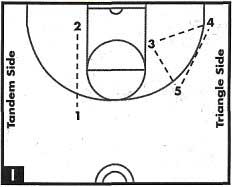 |
Tandem Entry#1 has the ball and #2 moves up the side to the free-throw line extended. Several things can happen at this point: #1 can pass to #2 and cut off him for a hand-off. #1 can pass to #2, cut over him, and then pick and roll with him. On the Triangle side, meanwhile, #3 and #4 move into the block (low post) area to set a double screen for #5. The latter will take his player behind the screen, then pop out toward the tandem side (just above the free-throw line) for the pass from #2 (providing #2 did not hand off to #1). |
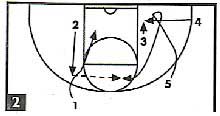 |
Switch ShoesIf #5 does not get the ball (in Diagram 2), he continues his route to the other side to form the Triangle with #1 and #2. #1 has continued his cut (shown in Diagram 2) and now looks for a pass from #2 and a jump shot; or #2 can pass to #1 and slide the lane to play a two-man game with #1, as that side of the floor will usually be open. #2 can also turn and face up with his defender for a one-on-one situation. #4 will glide up to the tandem post, while 3 pops to the top (as shown in Diagram 3). If #1 has the ball in the corner, #5 can duck into the lane and get a pass from #1 for an easy lay-up or dish-off. As you can see, the Triangle and tandem are now on opposite sides of the floor. As we proceed, we are going to start every entry with the Triangle and tandem in these positions. |
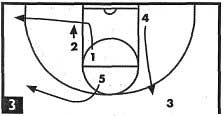 |
Triangle Entry from Corner
#5, with the ball, passes to #4 in the corner to start the series, while #3 steps up to pick for #5, who cuts off #3 to the hoop, looking for a pass from #4. If #5 fails to get this pass, he runs a route across the lane and curls around #2 - looking for the pass from #4. If he still does not get the pass, he will drift to form the Triangle on the left side with #2 and #1. As #5 is running through the lane, #3 sets a pick for #4 and looks to play a little pick-and-roll with him. |
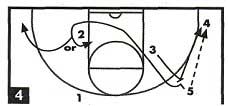 |
If nothing materializes from the Corner Entry, #4 will dribble to the top and #3 will go to the low block to form the other half of the tandem. Players #5, #2 and #1 will make up the Triangle on the left side. |
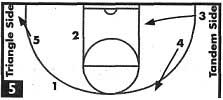 |
Triangle Entry from Post
#5 passes to #3 in the post, while #4 runs baseline, looking for a backdoor pass from #3. Meanwhile, #1 joins #2 in a double-screen and #4 curls around it, looking for the pass from #3. If #4 does not get the pass, he proceeds to the top to form the Triangle with #2 and #1. # 2 then flares to the corner. #5 can cut off #3 for a hand-off or play a two-man game with #3 as soon as #4 clears out. If nothing happens, #3 will dribble out and #5 will go to the post to form the tandem side. #3 can also face go one-on-one with his defender. |
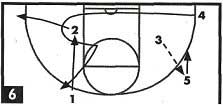 |
Triangle Options
Triangle Post Option#5 (with ball) passes to #1 moving toward them, as #3 locks out his defender, and then steps into the lane for the quick pass from #1 and makes a lay-up. |
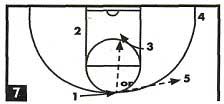 |
Tandem Backdoor Option.#2 steps toward the baseline, then jab-steps and come up the court for a pass from #5 at the Triangle elbow. #1 takes two or three steps to the left and cuts toward the basket for the pass from #2. |
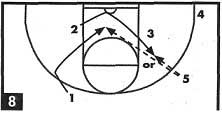 |
Tandem Screen-And-Shoot Option.The players proceed as in Diagram 5 until #4, instead of curling around the double-team (2-1), swerve into the corner, looking for the skip pass from #3 and a jump shot. |
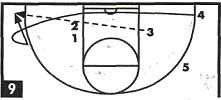 |
Triangle Pop-And-Shoot Option.Play proceeds as shown in Diagram 2 with #1 passing to #2 and then cutting over him while #5 fakes a cut around the 3-4 double screen and moves into the near corner for the long skip pass from #2. If #5 fails to receive the pass, he can cut over the screen and look for a pass from #2 and a shot from the free-throw line area, or he may cut under the double-screen and look for a pass under the basket for an easy lay-up. |
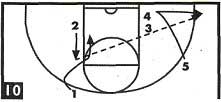 |
The Triangle Offense gives the players a lot of freedom with which to use their talents to the maximum. As the players become familiar with the offence, they will find a lot of opportunities for dish-offs as the defence tries to adjust. You can also have your tandem players exchange positions. Above all, you must strive for top-flight execution. You will need the proper spacing, passing, changing speeds, and good changes of direction, to keep the defence working hard.
Page Reference
If you quote information from this page in your work, then the reference for this page is:
- MERGELSBERG, S. (2005) Simplifying the Triangle Offensive [WWW] Available from: https://www.brianmac.co.uk/basketball/hstrioffen.htm [Accessed